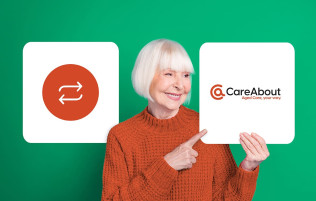Top 5 tips for staying safe this summer

Ah, summer in Australia – the season of backyard barbecues, cricket matches and crowded beaches. But it’s also the time when soaring temperatures can feel more than just uncomfortable – for older people, they can be downright dangerous.
That’s because people over 65 are more vulnerable to heat-related illnesses. And according to the World Health Organization, heat stress claims more lives than any other natural hazard!
Symptoms of heat-related illness include:
- Fatigue
- Nausea
- Headache
- Excessive thirst
- Muscle aches and cramps
- Weakness
- Confusion or anxiety
- Drenching sweats, often accompanied by cold, clammy skin
- Slowed or weakened heartbeat
- Dizziness
- Fainting
- Agitation
The good news? With a little know-how, staying safe this summer doesn’t have to mean hiding indoors with the air-con blasting 24/7 (although that’s not a bad idea). Here are five simple ways to beat the heat and enjoy the season safely.
And remember, you can use your Home Care Package to help you with summer safety measures around the home, so have a chat with your provider about what’s possible.
1. Stay hydrated
Staying hydrated is one of the most important things you can do during the summer months. But dehydration is sneaky – by the time you feel thirsty, your body might already be low on fluids.
- Aim to drink 6 to 8 glasses of fluid a day. The easiest way to do this is to keep a water bottle nearby and have little sips throughout the day, even if you don’t feel thirsty.
- If plain water isn’t your thing, jazz it up with a slice of lemon, cucumber or mint.
- Love your cuppa? Stick to decaf when it’s hot, as caffeine can dehydrate you. And as tempting as that icy cold beer might be, alcohol can actually increase the risk of heat-related illness.
Did you know? Fruits and veggies make for a great hydrating snack. Try berries, oranges, grapes, carrots and lettuce. Keep cubed watermelon in your fridge for easy access!
2. Pay attention to the forecast
Alongside dehydration, overheating is a huge risk to older people during the summer months. So, you’ll want to avoid being outside during the hottest part of the day.
- Planning some exercise or got errands to run? Schedule it for early in the morning or later in the evening when it’s cooler.
- If you must be outside, stick to the shade and take breaks often. Drink water before you head out, and take a bottle of water with you. Wear appropriate clothing that won’t cause you to overheat but still protects you from any sun.
- Ensure you have a way of cooling down afterwards, whether that be turning on air conditioning before you leave, or having a cool shower when you get home.
Did you know? Certain health conditions and medications can make it harder to cope with extreme heat. Chat with your doctor about any precautions you should take.
3. Slip, slop, slap, slide!
Having the right gear when you’re heading outside can make or break your summer experience.
- Slip on light, loose-fitting clothing that covers as much skin as possible. Wear natural fabrics like cotton and linen, as they’re breathable and help wick away sweat.
- Slop on sunscreen with SPF 50 or higher, at least 20 minutes before going outside. And reapply regularly.
- Slap on a broad-brimmed hat to protect your face, neck and ears.
- Slide on wraparound sunglasses that cover as much of your eyes as possible.
Did you know? Wearing thongs/flip flops can contribute to falls. So, while it might be tempting to wear them in hot weather, opt for footwear that offers support and good traction.
4. Create a cool haven at home
Don’t wait till your home feels like a sauna to take action against the heat.
- Close all doors, blinds and curtains during the day to keep the heat out.
- If you have air conditioning, use it! Most air conditioning units run more economically if they’re kept on at a steady temperature, rather than used in short blasts.
- Use fans strategically – place a bowl of ice in front for some DIY air-conditioning magic.
- A cool, wet cloth (or ice pack) on the back of your neck can do wonders on a hot day!
- Try cooling down with a refreshing bath or shower. If it’s difficult for you to do this safely, speak with your provider about home modifications using your Home Care Package.
Did you know? Air-conditioned environments like shopping centres, libraries and cinemas are fantastic places to spend time if your living space is too hot.
5. Keep an eye on your health (and your mates)
Hot weather can cause heat exhaustion or heatstroke, which can escalate quickly if not treated.
- Check in on older neighbours, friends or family members, especially if they’re living alone. A quick chat can make sure everyone’s coping with the heat – and it’s a great excuse to catch up.
- Watch out for symptoms like dizziness, nausea, headache, confusion or excessive sweating.
- It’s always better to be safe than sorry, so call 000 for assistance if these symptoms occur.
- If possible, move to a cool spot, sip water and try to lower your temperature with cool wet cloths (e.g. towels) until the ambulance arrives.
Did you know? You should never give aspirin, ibuprofen or paracetamol to a person affected by heat as they can be harmful.
Bonus tip: Your provider is there to help
A good home care service provider knows the risks of hot weather. And their staff will be trained to manage the health of older people during heatwaves, including:
- monitoring fluid intake and encouraging people to drink small amounts of fluid often
- being aware if toileting becomes less frequent (a sign of poor hydration)
- assisting with sunscreen, hats and protective clothing if sun exposure is possible
- offering tepid sponging or showering
- being aware of the signs of overheating that constitute an emergency.
Did you know? If you’re looking for a quality home care provider to help you or a loved one stay safe this summer (and beyond), CareAbout can find your perfect match! Click the button below to start the conversation.








